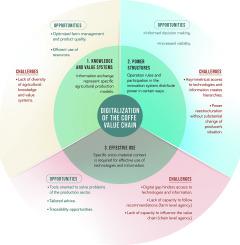Agricultural Systems ( IF 6.1 ) Pub Date : 2023-04-14 , DOI: 10.1016/j.agsy.2023.103660 Francisco Hidalgo , Xiomara F. Quiñones-Ruiz , Athena Birkenberg , Thomas Daum , Christine Bosch , Patrick Hirsch , Regina Birner

|
CONTEXT
Digital technologies have the potential to address several sustainability challenges of the coffee value chain, however, given potential backlash consequences, this process must be assessed thoroughly. Descriptions of digital tools designed for this value chain have been presented in the literature, however, a critical examination of socio-environmental consequences of the process of digitalization is still lacking.
OBJECTIVE
Using a socio-technical approach, this article examines innovation pathways proposed by the process of digitalization in the coffee value chain and identifies the opportunities and challenges of these pathways to contribute to sustainability goals in this value chain.
METHODS
Technical characteristics of 20 digital tools oriented to the coffee producing sector are examined. We carried out a review of secondary information and conducted online semi-structured interviews with developers of these tools. Qualitative analyses of these characteristics were conducted across three themes: 1) knowledge and value systems represented, 2) power structures, 3) effective use of digital technology.
RESULTS AND CONCLUSIONS
Our analysis identified two digitalization pathways that are likely to affect different dimensions of sustainability. On the one hand, digital advisory services are focused on the diffusion of conventional agricultural practices to optimize production for a commodity market. On the other hand, trade platforms and traceability systems are associated with enhanced visibility of producers to facilitate their participation in differentiated markets. However, access barriers to technologies create asymmetrical participation of producers in these scenarios. Additionally, evidence shows that, more than a revolution, digitalization of the coffee value chain is about optimization of production based on the use of synthetic inputs and of traditional extension models, and more efficient social coordination within already centralized power structures.
SIGNIFICANCE
The analytical framework based on the technical characteristics of digital tools and their interaction with social systems revealed that sustainability outcomes derived from the process of digitalization in the coffee value chain are far from being straightforward. Considering digital technologies not as a homogeneous category, but as a configuration of different technical arrays, each one with distinctive patterns and impacts, provides a more nuanced understanding of the role of digitalization for agricultural development.
中文翻译:

数字化、可持续性和咖啡。农业发展的机遇与挑战
语境
数字技术有可能解决咖啡价值链的几个可持续性挑战,但是,鉴于潜在的强烈反对后果,必须彻底评估这一过程。文献中已经介绍了为该价值链设计的数字工具的描述,但是,仍然缺乏对数字化过程的社会环境后果的批判性研究。
客观的
本文使用社会技术方法,研究了咖啡价值链中数字化过程提出的创新途径,并确定了这些途径为实现该价值链中的可持续发展目标所带来的机遇和挑战。
方法
研究了面向咖啡生产部门的 20 种数字工具的技术特征。我们对二手信息进行了审查,并对这些工具的开发人员进行了在线半结构化访谈。针对三个主题对这些特征进行了定性分析:1) 所代表的知识和价值体系,2) 权力结构,3) 数字技术的有效使用。
结果和结论
我们的分析确定了两种可能影响可持续性不同维度的数字化途径。一方面,数字咨询服务侧重于传播传统农业实践,以优化商品市场的生产。另一方面,贸易平台和追溯系统与提高生产者的知名度相关联,以促进他们参与差异化市场。然而,技术的获取障碍造成生产者在这些场景中的不对称参与。此外,有证据表明,咖啡价值链的数字化不仅是一场革命,还涉及基于使用合成投入和传统推广模式优化生产,以及在已经集中的权力结构中进行更有效的社会协调。
意义
基于数字工具的技术特征及其与社会系统的相互作用的分析框架表明,咖啡价值链中数字化过程产生的可持续性成果远非直截了当。不将数字技术视为同质类别,而是将其视为不同技术阵列的配置,每一种技术阵列都具有独特的模式和影响,可以更细致地理解数字化对农业发展的作用。











































 京公网安备 11010802027423号
京公网安备 11010802027423号